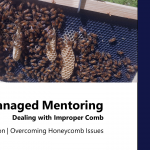69 entries.
Hi Kevin, I'm brand new to this new world of beekeeping and have just been to my first beginners lesson. Could you direct me to any podcasts you've done covering beginners or starting out? I've been listening to many of your pods for guidance and must say they are fantastic even if sometimes a little advanced for me! Thanks man. Fin
Hi Kevin. I love the the podcast. It introduces me to many new ideas in beekeeping. You have mentioned a microfiber cloth available from Amazon.com several times. I think you referenced someone you heard of recommended them. Do you have a link to purchase the cloths so that I get the correct one?
Hi Kevin,
First thanks for the podcast. Excellent source of information - and keeps me company when I'm out and about.
Reason for posting is that I've just read an article in The Beekeepers Quarterly - not sure if you know the publication as it's mainly European based - which I found interesting and would value your views on. It's by Ann and Maciej fron Opole in Poland and concerns their experience of using of Rhubarb to control varroa mites. Now I'm not sure if you have rhubarb in the US but that Yorkshire delicacy of rhubarb and custard (do you have custard is the US?- I'm sure you must) has a particular zing to it and that zing is caused by low levels of oxalic acid in the stalks.
Ann and Maciej have been experimenting by laying rhubarb leaves across the top bars in the brood box. The bee's work to clear the leaves away and in the process release low levels of oxalic acid throughout the bood box. They claim a natural mite fall rate increase of between 2 to 7 times during the summer months when it's particulalry hard to treat for varroa and leaves the hive in good shape for conventional autumn treatment in that varroa counts are at reasonably low levels when conventional autumn treatment starts.
They're still doing work on the topic and I'm sure more will come of it but it might offer a low cost (no-one has a use for rhubatb leaves), low tech (just open the hives and place the leaves in - the bees do the rest), natural (rhubarb is a foodstuff so no medicinal certification needed) route to varroa control.
Have you heard of this method before? Is it likely to be effective - and can you see any problems if the method is adopted?
Keep up the good work
John N.
Hey Kevin it's been a couple years since commented but always keep up with the podcast, this past weekend I stumbled across this new (to me) product called "Mike's Hot Honey" and thought of you and your podcast immediately it is outstanding on just about anything and what it is, is pepper infused honey and I would say his recipe is a must try please feel free to share this with all and enjoy
Hi Kevin, In Episode 105 you lamented your losses. Here's something that might help next year: - Do your hives get DIRECT sun?? The master bee keeper in my parts said "Its not whether you insulate or not, its whether you feed them and have them in the DIRECT SUN or not". The president of the MCBA said he also puts a black plastic skirt around the hive stand too. (green house affect). Keying off of those two points, I did 3 things - I wrapped them in tar paper for heat, and added a **passive solar collector** in front of each one to absorb and transfer the heat up and sugar shims. Cheap passive solar collector: A black plastic box lid (2'x3') put in a black plastic trash bag, and put those in a clear plastic trash bag - in front of the hive and sloped up toward the hive entrance, (tilt it like a solar panel, and it looks like an inflate-able black slide (cheap looking). I also threw a brick in the bag to keep it anchored from the wind. So that they get a double dose of heat from the tar paper and the passive solar collector. So even on those cold clear days, the hives still get warmed by the sun. Next year, I'm considering putting a larger thermal collector beneath (like a long mini green house along the length of the hive table, with a green-house auto-closing vent that lets hot air (only) through a small drill hole in the bottom of the hives. I'll also put insulation on the sides/back, and top of the hives ONLY , and putting up a 3 sided wind screen made from that black/grey fiberglass weed-barrier cloth. (too much?) My only question for you - did you have sugar shims directly on top of your frames? I did shims, and added home made pollen patties to it too. (See the video from beverlybees.com). I'm a 1st year beekeeper, and lucky for me, both hives are still alive - bees were pulling pollen in Feb from Aspen & pussy willows. They were buzzing in their hives yesterday, but today is the Stella Nor'Easter - 2 feet of snow expected, and the weather has been in single digits at night. So I'm not out of the woods yet. My mentors lost 5 out of 6 hives. I'm a long time listener - originally found you on youtube. Great stuff, love the gadgets. I built 'Coats' nucs in Jan, with mods for Shop vac attachments, and to be used as swarm traps. (Got a table saw for the holidays - so this is dovetailing into some other great hobbies. )
Its nice to have so many podcasts to listen to now - I listen to one every night before I go to sleep.
Keep up the good work!
...Don...
Hey Kevin,
Spring has sprung with winter popping in and out.
First I'd like to say you still have the best source of information and I am sincerely impressed with your sharing. You nd Bob seem to do well bouncing ideas off each other and I for am thrilled with the chat between you two.
I would like to add a source of frustration with some of Facebook bee groups and online sources. As I am looking at oxalic acid for the first time. Randy Oliver has a great presentation on it as do others. That's not the problem. What surprises and ANGERS me are the folks following it thinking that OAV or OAD is the magic bullet.
I talked with some friends I know in Europe (Belgium, France and Italy) and they are saying the mites are becoming immune to the treatments. People in the US have a wonderful opportunity to use OA but like penicillin it isn't the only thing you should use.
The mites will adjust or become immune if that is all that is used and people don't seem to understand it. OA, in my opinion, should be used as part of IPM. IPM includes breaking the brood cycle (making splits, replacing the queen), other treatments as well as testing for mites. I use screened bottom boards just to be able to slide out the insert to see what's there. I have pulled off Facebook for Lent but to bee (lol) honest I would have done so because people believing one type of treatment is all you should do. Yes OAV/D will work but keep looking what others do in your area.
Ok let me get off the soapbox and use that wood for something.
I read and heard about your nucs.... keep working on them and learn. Also thanks to you and Bob on the hive autopsy link I have shared that and Randy Oliver's OA presentation with folks very nice stuff.
Thanks I do reference your podcasts to others as even if you are just interested in beekeeping but aren't keeping bees... it's entertaining.
Thanks for the work you do and all the best to NWNJ club too... you guys are doing it right.
John
Love the podcast, listener for a few years. I wonder if you know anything about an issue I have, or suggestions for where to get info. My hives are on a non-profit urban farm property that abuts city owned property. The city is planning to spray herbicides (aminopyralid, clopyralid, aminocyclopyrachlor, and imazapyr) on thistles in the area. Should I be worried about my bees? Is thre anything I can do to mitigate damage?
Hi Kevin,
I get a lot of questions about the Flow Hive. I believe you've mentioned it before but I wondered if you've tried it or if you have intent to do so. Here's a review of it that I've given my friends.
The value of the flow hive, as opposed to other MUCH less expensive options, is in how easy it is to harvest the honey. If you want less work harvesting honey... then PERHAPS the flow hive is worth the money. The other part of the cedar flow hive that I rate very high is the quality of the craftmanship. The boxes themselves are really, really nice. Cedar will last essentially forever with just a nice coat of tung oil. Furthermore, it is just obvious that whoever is making these things put a lot of care into the design and execution of production.
HOWEVER, with the problems of disease, pests, and pesticides marrying together for a terribly challenging landscape for beekeepers... this hive option will most likely NOT reduce the amount you should be going into the hive. I believe we need to be gathering data as beekeepers. We need to LOOK at the frames on which bees are working. Post-mortem analysis of a hive is too late to know what went wrong. AND you should have more than one hive... which makes the price-point for the flow-hive that much more overwhelming.
I must declare that my analysis may be a little biased... my bees did not fare very well in the flow hive. The reasons for this were likely multiple and might not be solely because of the flow hive itself. But, one of my flow frames had a missing piece and ants got into the hive... those little buggars!
Either way, I found the flow hive elegant yet at the same time (paradoxically) problematic. I also sort of doubt the plastic flow frames will do very well in the significant temperature fluctuations that we get in New England.
A philosophical note: Bees have adapted to primarily nest in wooden homes with "homemade" wax furnishings. I think that it might be kind of weird for the bees to live in plastic. The plastic itself is relatively similar in physical properties to wax but it's still not the same. It could (I'm conjecturing here) be analogous to if we started using only stainless steel furniture without any upholstery whatsoever.
So those are some of my thoughts about the flow hive. I don't really think that it will save much in the end and may end up costing you more than you'd like.
I do appreciate the awareness that the flow hive has created regarding beekeeping in general! It's a really cool invention and I look forward to following the company's progress.
Thanks so much for your work!
Ben
Hi Kevin, I have listened since almost the beginning. And, listened over and over again. I always go back and listen to you drifting off to sleep at night. Lol, that doesn't mean you send mebto sleep, but my mind goes off on tangents with my own bees in mind , when I listen to your own adventures. I love the podcast, and being va beekeeper for 7 years, I have learnt along with you...thank you. Also, I cannot see a little dot on your map for my visit to your webpage. I visit quite often for links. Is that normal? Can you not see your own visit? Take care, look forward to future adventures. X dawn
Great job Kevin. Don't know how you find the time to put out the podcast. Seems like all my spare time goes to putting equipment together. Very much appreciated. You always seem to have something interesting to comment on. Keep up the great work.
Hi from coastal North Devon (UK). Love all your hard work Kevin - so good to hear from other Beekeepers - the Podcast is so helpful. Zara
I am a new listener and have enjoyed your podcast. Thank you, my daughter and I look forward to the next show.
Hi Kevin,
I started listening to your podcasts a month or so ago. Started at 97 or something then went back to 1.
Loving the narrative and the dedication after 8 years so well done.
I've been listening to your podcast for years now(even relistening multiple times)....missing your updated insights the past couple months. Hope all is ok! Just wanted to know you have fans pining out here for more!!!!
Dear Kevin.
Looking forward to Episode 100 of the Podcast !!! I have listened to every one so far, learned a lot. They are great and thank you so much for all your hard work.
Best wishes, Ingo.
Hi!
My name is Ben, I'm a big fan of your content. Just wanted to commend you on your love for tech. I think it's a really cool passion of yours that I appreciate, though I don't invest as much in it myself. Mostly, I've just tried out the flow hive and have some of my information stored on hivetracks.com.
I wanted to share with you a new show coming up that could be an opportunity. If you have a cool invention, perhaps "Make Me a Millionaire Inventor" could help you out. I am in no way affiliated with them, I just thought of your interest in gadgets when I heard about it.
Again, love your show. I've got 12 hives up here in NH and am slowly but surely building my expertise in queen rearing because there's a lot of demand for Northern Queens and local nucs.
Happy Beekeeping!
Ben
Hi!
While not keeping bees, I'm still interested and am slowly working through Your podcasts.
I would like to report, however, that episode #81 seems to be compromised. Over a period of two weeks I have occasionally tried to download it, but will only get just shy of 3 MBytes.
Best regards!
/Sven
Thanks for the great website. I just built your hive stand, and I've got a couple of comments. First, it's a GREAT design!.
First comment: While the cut list is correct, there are two errors in the dimension picture. The two horizontals in the saddle area that the bottom board sits on show 12". They need to be 11"
Second comment: I'm running 8 frame boxes (13-3/4" wide), and this plan can be adapted for a perfect fit by decreasing the 11" sections by about 3-1/2".
Once again, thanks so much for the great plans!
Kevin
email/call me about the Arnia hive monitoring system. I have had three since March and there is an issue you need to know before instilling them.
2108638024
Hi, very nice site, Thank you. I constructed your hive stand model, worked fine for me! Have a look here : https://www.flickr.com/x/t/0092009/photos/yorthopia/26647597223/
Best regards





